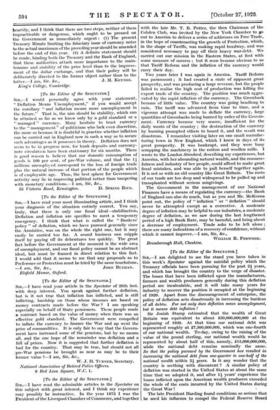[To the Editor of the SPECTATOR.] have read the admirable
articles in the Spectator on this subject with great interest, and I think my experience may possibly be instructive. In the year 1873 I was the President of the Liverpool Chamber of Commerce, and together with the late Mr. T. B. Potter, the then Chairman of the Cobden Club, was invited by the New York Chamber to go out to America to deliver a series of addresses on Free Trade, in the hope of counteracting the growth of Protection, which, in the shape of Tariffs, was making rapid headway, and was considered necessary to pay off their heavy war-debt. We carried ont our mission in the Eastern States, at first with some measure of success ; but it soon became obvious to us that Tariff Reform and the inflation of the currency would carry their day.
Two years later I was again in America. Tariff Reform was paramount ; it had created a state of apparent great prosperity, and was producing a large revenue, but the people failed to realize the high cost of production was killing the export trade of the country. The position was much aggra- vated by the rapid inflation of the currency. The Greenback became of little value. The country was going headlong to ruin. The tariff was advanced from time to time, and a. vigorous attempt was made to deflate the currency, large quantities of Greenbacks being burned by order of the Govern- ment. Currency became very scarce, insufficient for the daily wants of the country ; the destruction of the currency by burning prompted others to hoard it, and the result was disastrous. I remember visiting later on one small manufac- turing town in New England, which I knew in days of its great prosperity. It was bankrupt, and they were busy scrapping the machinery in the cotton and woollen mills. I wrote to the London Standard, describing my experiences, but America, with her abounding natural wealth, and the resource- fulness and industry of her people, could afford to make great fiscal mistakes, and was able to pull herself together again. It is not so with an old country like Great Britain. The roots of our trade are too deep and widespread to be pulled up and transplanted without serious misgivings.
The Government in the management of our National Finances have a means of regulating the curreney—the Bank of England can also do much, but as you and Mr. McKenna point out, the policy of " inflation " or " deflation " should never be attempted except as a corrective. A moderate degree of inflation may be helpful to our industries, a moderate degree of deflation, as we saw during the last lengthened period of a high Bank Rate, may be harmful, and bring about a decrease of employment. Trade asks to be left alone ; there are many indications of a recovery of confidence, without which it cannot improve.—I am, Sir, &c.,














































 Previous page
Previous page